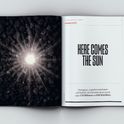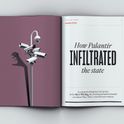Still hope for American democracy
In her splendid summary of the fissures that threaten the integrity of the American electoral system, Dahlia Lithwick invokes a Buddhist story about a “shattered bowl” that “was already broken in the first place” to describe our situation as we hurtle toward the 2020 presidential election.
We do not share Lithwick’s pessimism. Let’s begin with the broken bowl, a story told by Ajahn Chah, an influential 20th-century Buddhist monk and teacher. “Do you see this glass?” Chah asked. “I love this glass. It holds the water admirably. When the sun shines on it, it reflects the light beautifully… But when I understand that this glass is already broken, every minute with it is precious.” When we see our democracy for what it is, a delicate edifice already cracked and compromised, we can focus our attention on the glue that holds it together: trust. Trust in one another, in our institutions, and perhaps even in our elected officials.
As Lithwick observes, trust has been on the wane for decades, and not just in the US. Eroding trust is an issue facing democracies around the world. Whether this erosion results from persistent efforts by authoritarian interests or less sinister forces, there is little we can do at this late date to restore trust already lost. Like decarbonisation, it takes longer to reverse the problem than to create it. The best we can do is to continue to act with integrity and transparency, guided by principles of decency and fair play. Even if we are convinced the other side is cheating (and they believe the same of us), we must play by the rules set forth in our Constitution.
Sowing distrust and persuading citizens that participation is futile are the very tactics employed by Trump and his antidemocratic brethren. If we were guided by Lithwick’s conclusion—that the trust essential to making democracy work is already gone—then the serious work of planning litigation, protecting vulnerable voters, and countering lies might as well be abandoned as pointless. In truth, we cannot say with certainty when the bonds of trust that hold the chalice of democracy together will finally give way. Our electoral system is so complex and dynamic, with so many inputs and chaotic interconnections, that the outcome is impossible to predict.
We can’t know whether we will succeed in overcoming prophesies of the American experiment’s demise. But to enact daily the hope that we will is not a matter of blind optimism, rather one of well planned, aspiration-driven, reality-based advocacy, organisation, and carefully timed execution. We have our work cut out for us. Let’s get to it.
Laurence H Tribe, Harvard, and Mark Tribe, New York School of Visual Arts
The judge in a democracy
My friend Helena Kennedy is right to praise Lord Bingham (“At law,” October) but I part company from her in the suggestion that the very notion of a review of the way judicial review works is “constitutional vandalism.” On the contrary, I believe that an examination of this kind is timely.
In his excellent book The Rule of Law, Bingham said that judicial review of the lawfulness of administrative action “is the judges’ stock in trade, the field in which they are professionally expert. But they are not independent decision makers and have no business to act as such… They are auditors of legality; no more, no less.” He adverted to the fact that the “unreasonableness” rubric in judicial review was “more difficult territory,” and it is this contested area into which some decisions may be seen as straying.
However much we may welcome individual decisions, the broad concept that the judges have developed of the rule of law (seen for example in the Unison case on employment tribunal fees) enlarges their constitutional role so as to be more like that of the US Supreme Court.
There has been an explosion in the number of judicial review cases over recent decades, and the generous views of time limits for claimants are also ripe for review. I hope the committee can go about its work away from the vandal tendency within the government. Thankfully Edward Faulks, the chair, is hardly a card-carrying member of the “weirdos and misfits” brigade.
John Bowers, barrister
Tom Bingham is without a doubt my legal hero. He was the senior law lord from 2000, and when I joined the House of Lords in 2004, he led us with great distinction and a wonderfully light touch. He wasn’t bossy at all, but you didn’t want to do anything that he wouldn’t approve of, and that was because of his towering legal intellect but also his great personal qualities.
He led very much by example and it took a lot of courage to disagree with him. He wouldn’t be cross with someone for disagreeing—he would certainly be happy if one did that—but it took intellectual and moral courage because he was always right. He was always, always right!
Brenda Hale, former president of the Supreme Court, (as told to Prospect’s Alex Dean)
The uncertainty principle
Covid-19 is a new disease and there was necessarily great uncertainty in the early days, with rapidly evolving evidence. This means, as Philip Ball argues (“The dark arts, ‘the science’ and the human toll,” October), that attempts to present science as a monolith, justifying a single course of available action, were at best misleading and at worst damaging. Policy had to change in response to new evidence.
For instance, good evidence on face coverings became available over the spring and early summer. New policies mandating their use in certain situations was good policymaking, but risked being undermined by accusations of “U-turns” when the uncertainty in the science was not understood.
Even now, we still don’t fully understand the role of children in transmission, nor what proportion of people infected are asymptomatic (estimates range from 30 to 80 per cent!). We certainly do not know yet what the long-term health impacts are; there is growing evidence that the heart and lungs are damaged in many who suffer even from mild forms of the disease.
As we move into autumn, the government faces the difficult job of supporting the economy while suppressing the virus, in a situation with many aspects we do not understand. Independent Sage is committed to presenting these uncertainties and being transparent about the choices ahead.
Christina Pagel, Independent Sage
How the west won
Anatol Lieven’s rant against capitalism and freedom (“How the west lost,” October) reminds us that gloom sells. So does economic ignorance packaged as deep strategic thinking, and musty academic Marxism that has learned nothing at all from the 3,000 per cent increase since 1848 of real income per head for the formerly wretched of the earth.
After the fall in 1989 of the socialist plan of economic coercion, and contrary to Lieven’s rage against sensible liberals like Fukuyama, prosperity exploded. A mythical “Chinese model” didn’t do it. China in fact liberalised, though the country is backsliding now. It was the “deeply flawed” western model, in Lieven’s phrase, that raised up the poor of China and then India, as had happened long before in Britain.
The cause of the startling enrichments after the upheavals of 1776 or 1848 or 1989 has been, as Marx wisely said, “constantly revolutionising the instruments of production.” Lieven is right that “minimal moral values” are the ticket to the good society—those values which liberate adults from subordination to aristocrat, husband or planner.
Deirdre McCloskey, economist
Frosty reception
Your profile of David Frost (Boris’s brick wall,” October) is too generous. It is now clear that any deal achieved with the EU will be a fig leaf, disguising a scale of rupture that the Leave camp strenuously denied would happen during the referendum.
The detailed work that our chief negotiator needed to undertake to achieve compromises on state aid, fishing, mutual recognition of qualifications and the protection of key industries has simply not taken place. A minimalist zero-tariff, zero-quota arrangement is now the best that can be hoped for, but even this “deal” will severely damage British economic interests, in particular high-value-added manufacturing and financial services. “Frosty” demonstrates no grasp of this reality.
What he does grasp is the courtier’s need to say what King Boris wants to hear. Frost calculates that playing up Britain’s readiness to rupture with Europe completely (instead of being a “quisling”—the unfair charge levelled at his predecessor) may frighten EU negotiators into making last-minute concessions. But the EU knows the vital work has not taken place, has no intention of sacrificing its hard-won achievements and is readying itself for no deal.
It is a dangerous game for an individual who purports to represent the British state. But Frost is not a civil servant dedicated to the public interest. He is a vainglorious partisan who has successfully advanced his own career, to the disadvantage of our country.
Will Hutton, former editor of the Observer
The taxing reality
Reading the “duel” between Jonathan Portes and Bill Mitchell (“Are tax rises now inescapable?” October), I was struck by the complete lack of reference to politics.
There are many reasons to be highly sceptical of the mystical powers of modern monetary theory, but foremost among them is this notion, hinted at by Mitchell, of fine-tuning inflation through regular adjustments to taxes. Nobody pushing this idea can have spent much time actually trying to implement a tax rise—and a glance at the backlash over recent weeks in response to briefings that Rishi Sunak is merely thinking about raising taxes should serve as advanced warning of what a disaster it would be if we tried to use fiscal policy to control inflation.
As Portes rightly points out, over the long term taxes will need to rise to pay for an ageing society and rising healthcare costs. The choice over the timing and nature of those rises will, however, largely be driven by the politics. The result will be messy compromises, unlikely to satisfy many economists, and certainly unlikely to coincide with what is needed to keep inflation stable.
Tim Pitt, former Treasury adviser
Literary comrades
The doubtful assumption that ideological differences must get in the way of friendship, to which Miranda France draws attention in her excellent piece (“Call time on ‘cancel culture,’” Aug/Sept) is a commonplace of literary life. According to his widow, George Orwell’s greatest friend in the late 1940s was the novelist Anthony Powell, an arch-Conservative lieutenant-colonel’s son married to the daughter of an earl. None of Orwell’s attempts to convert Powell, for example by buying him a subscription to the left-wing weekly Tribune, met with the slightest success, yet the two remained on the most cordial terms.
In the diaries written in his old age, Powell regularly complains of interviewers’ obtuseness on this point. He was particularly irked by Bernard Crick, Orwell’s first biographer, who “remarked when he lunched here that he could not imagine how Orwell and I had ever been friends.”
DJ Taylor, critic and novelist
Full Rosster
In addition to the three Ross County goalies mentioned in October’s “In fact”—Ross Laidlaw, Ross Munro and Ross Doohan (a late addition, on loan from Celtic)—the first team squad includes Ross Draper, a midfielder, and Ross Stewart, a striker.
The academy sides are clearly looking to maintain the Staggies’ tradition: Logan Ross, Under 18s goalie; Ross Hardie, Under 16s striker; Ross MacLeod, Under 15s midfielder; Fergus Ross, Under 13s midfielder; Fraser Ross, Under 12s midfielder; and Jack Ross, Under 11s striker.
Unsurprisingly, a search for eponymous players at Cowdenbeath and Stenhousemuir proved less fertile, although the former has two players with a first name of—you’ve guessed it—Ross!
Hugh Smith, Teddington
In fact:
People in 14 advanced economies were asked if their country had done a good job dealing with coronavirus: Denmark came top, with 95 per cent agreeing it had. The UK (46 per cent) came last.
Pew Research Center, 27th August 2020
An analysis of 300,000 tracks on driving-themed Spotify playlists shows that the song most listened to in the car is “Sweet Home Alabama” by Lynyrd Skynyrd.
Antimusic, 3rd August 2020
The Isles of Scilly have the world’s smallest football league: its two teams, the Garrison Gunners and the Woolpack Wanderers, play each other 18 times a season.
Fifa.com, 25th June 2020
Every combat veteran running for the US presidency since 1990 has lost, often to draft dodgers.
Economist, 17th August 2020
The UK’s favourite pasta shape is fusilli, chosen by 19 per cent of Britons, followed by spaghetti (15 per cent) and penne (11 per cent).
YouGov, 25th August 2020
The last time that every person was within the Earth’s atmosphere was 31st October 2000—two days later astronauts reached the International Space Station, which has been occupied ever since.
Air & Space, October 2020
Following the death of US Supreme Court justice Ruth Bader Ginsburg, Democratic fundraising platform ActBlue took $6.3m in one hour and $70.6m the next day, beating previous records of $4.3m and $41.6m respectively.
Guardian, 21st September 2020
The word “freelance” was coined by Walter Scott in his 1819 novel Ivanhoe to refer to a mercenary in the Middle Ages who was not sworn to any liege, and thus could be hired along with his weapon.
The Etymology Nerd, August 2020












